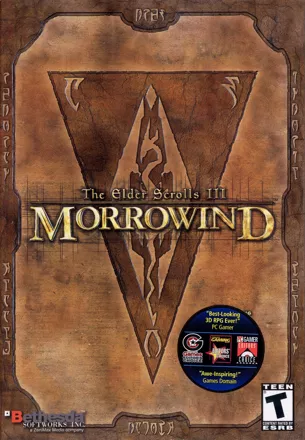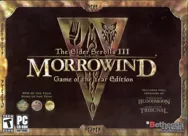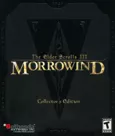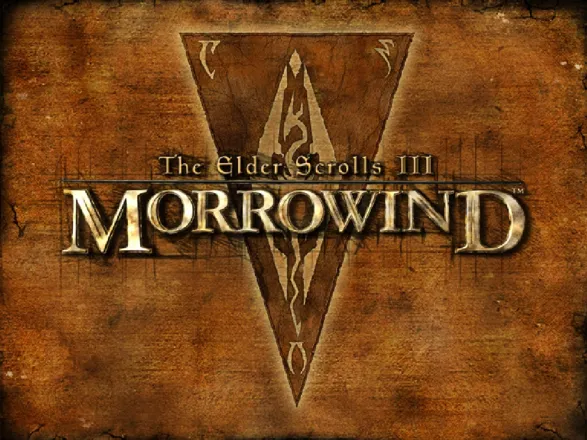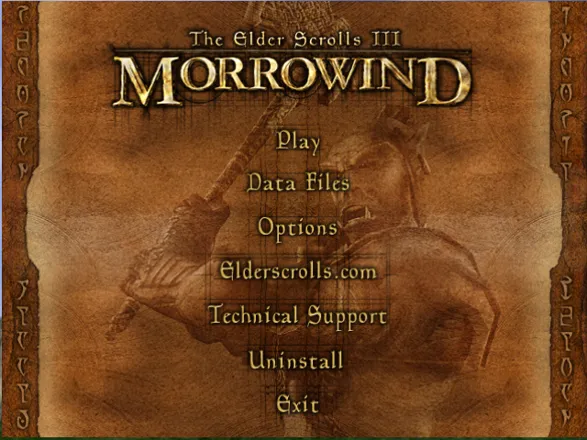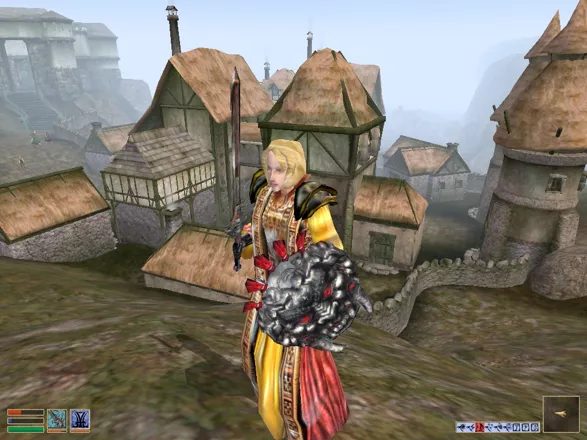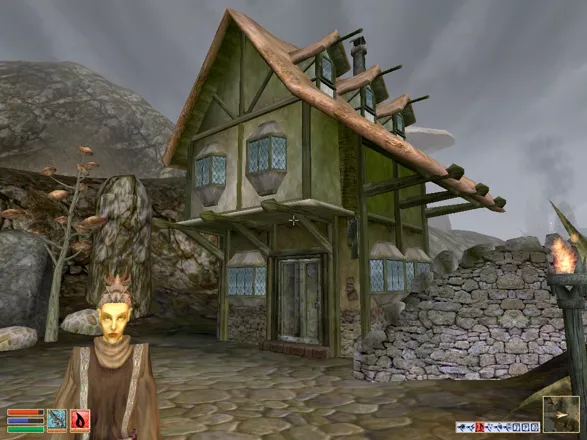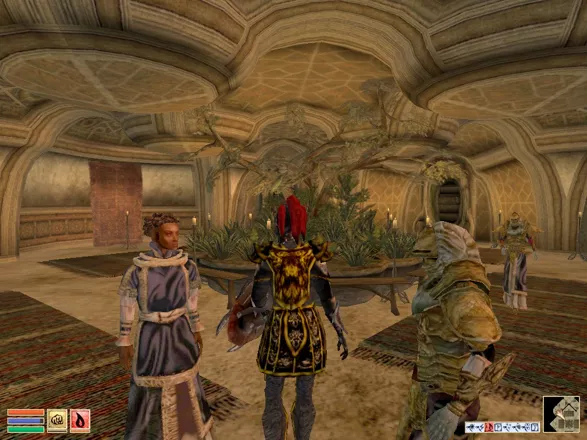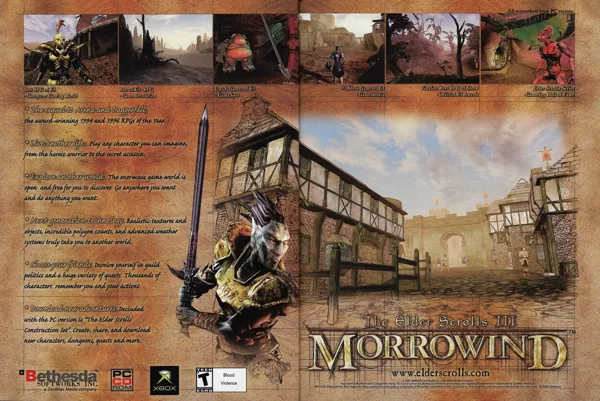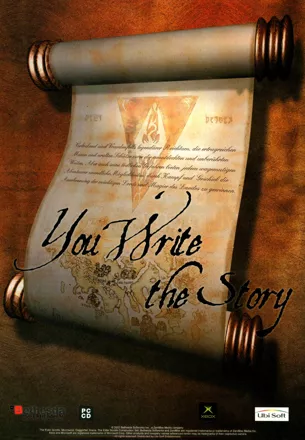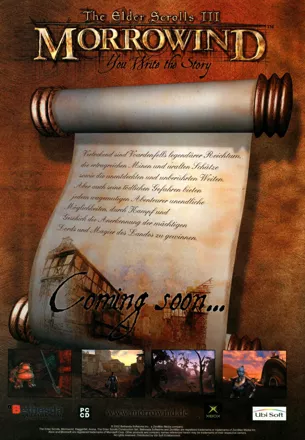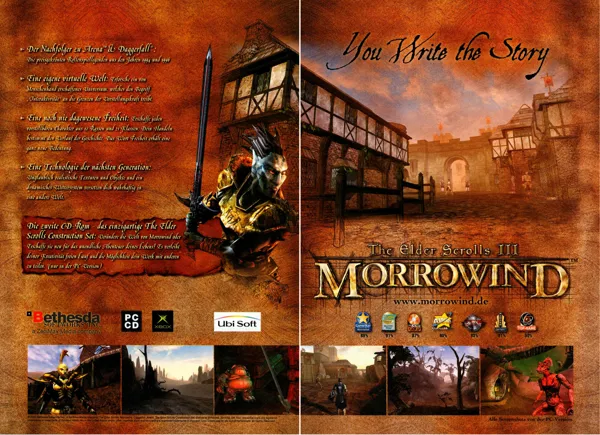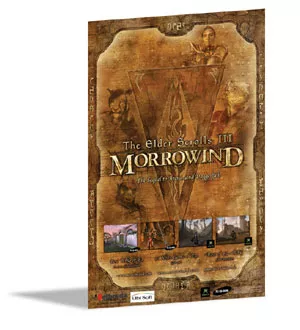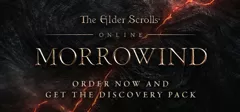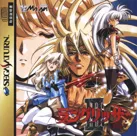The Elder Scrolls III: Morrowind
Description official descriptions
Freed by the decree of Uriel Septim VII, the Emperor of Tamriel, a lone prisoner is transported to the province of Morrowind. It seems that the strange dreams this prisoner has been having lately may have a connection to equally strange events occurring there. The protagonist is given a simple assignment: join the Blades, a secret organization whose goal is to protect the safety of the Emperor. This leads to a discovery of an ancient prophecy and an evil scheme concocted by a powerful deity whom the protagonist alone is able to stop.
Conceived in the tradition of the Elder Scrolls series, Morrowind is a fantasy role-playing game with a vast world open for exploration. After being released from a prison ship at the shores of the island Vvardenfell, the protagonist may do more or less what he or she wants: follow the main quest and solve the mystery of an ancient prophecy, join any of roughly a dozen guilds and rise in their hierarchy by performing duties, or simply explore the gigantic island with its stylistically diverse cities, hundreds of dungeons and tombs, ancient ruins and mighty fortresses.
Morrowind uses a two-stage skill system. The hero’s primary stats (strength etc.) increase with each level gained, while secondary abilities improve by use – for example, the more often the character jumps, the more proficient he or she becomes in the Acrobatics skill, etc. The action-oriented fights are simple exchanges of strikes or spells, until one combatant dies. The enemy's hit points and condition were not originally shown; however, at the request of customers a health bar was added for enemies as part of the first upgrade patch.
The protagonist's race and gender, but also his or her reputation influence the reactions of NPCs. If a character’s sympathy for the hero is low (rated on a scale from 1 to 100), he might refuse to answer questions; if it is high, the player will get more detailed information and better bargains in shops. Most quests involving other persons can be solved by persuasion, pick-pocketing, or simply by force.
The game's NDL 3D game engine is powerful in drawing wide, detailed outdoor landscapes as well as complex indoor environments. Transitions are not fluent; houses and dungeons must be loaded upon entering.
Spellings
- 上古卷轴III:晨风 - Simplified Chinese spelling
- 上古捲軸 III:魔捲晨風 - Traditional Chinese spelling
Groups +
- Animals: Cats
- Console Generation Exclusives: Xbox
- Covermount: Fullgames
- Elder Scrolls series
- Fantasy creatures: Dwarves
- Fantasy creatures: Elves
- Fantasy creatures: Orcs
- Gameplay feature: Alchemy
- Gameplay feature: Burden / Encumbrance
- Gameplay feature: Character development - Repetition
- Gameplay feature: Drowning
- Gameplay feature: Equipment quick slots
- Gameplay feature: Hunting
- Gameplay feature: Journal
- Gameplay feature: Paper doll inventory
- Middleware: Bink Video
- Middleware: Gamebryo / Lightspeed / NetImmerse
- PC Gamer Presents games
- Physical Bonus Content: World Map
- Protagonist: Female (option)
- Software Pyramide releases
- Technology: amBX
- Ubisoft eXclusive releases
- Xbox Classics releases
- Xbox Platinum Hits releases
Screenshots
Promos
Videos
Add Trailer or Gameplay Video +1 point
See any errors or missing info for this game?
You can submit a correction, contribute trivia, add to a game group, add a related site or alternate title.
Credits (Windows version)
118 People (80 developers, 38 thanks) · View all
| Project Leader | |
| Lead Designer | |
| Lead Programmer | |
| Lead XBox Programmer | |
| Lead Artist | |
| Lead Character Artist | |
| Programming | |
| Additional Programming | |
| World Art & Building | |
| [ full credits ] | |
Reviews
Critics
Average score: 89% (based on 83 ratings)
Players
Average score: 4.0 out of 5 (based on 284 ratings with 23 reviews)
The Good
Daggerfall, the predecessor of Morrowind in the Elder Scrolls series, was a very ambitious game that captured the hearts and the minds of many hardcore role-players, at the same time "scaring away" those who were overwhelmed by the size of its world and its openness. Some people felt it was too big, with too much random design, both for locations and inhabitants.
Morrowind corrects that right away by offering us what is undeniably its most valuable asset - its world. The world is the star of the game, a goal in itself; and it is quite amazing. Without doubt, it is one of the most mesmerizingly beautiful and attractive worlds ever to grace a video game.
Of course, the technical quantum leap contributed to the quality of the game's environment. The vision of Daggerfall was still slightly ahead of its graphical capacities; in Morrowind, technology caught up with imagination. No more desolate, poor sprites decorating the landscape; no more pixelation and drab textures. Morrowind is significant as one of the visually most advanced role-playing games in history; not ever since the first Ultima Underworld have we seen an RPG that challenges first-person shooters in graphical prowess. Yes, the characters could have used some more work, but both in- and outdoor areas are beyond reproach, and the water is absolutely gorgeous. I honestly can't recall another game from that time and even a few years later with such beautifully rendered water.
This world, however, becomes much more memorable thanks to its artistic side, its strong personality and sense of style. The province of Morrowind is exotic: giant mushrooms cover the lairs of strange creatures; majestic urban architecture co-exists with the native dwellings of the dark elves; twisted mountain paths, dark caves, rivers glistening under the busy sky - the world of Morrowind is a marvel, and it is worth to play this game just for its exploration.
And this exploration, like in the previous Elder Scrolls games, is absolutely unrestricted. You can go wherever you want right from the beginning. The gigantic world (yes, much smaller than in Daggerfall, but still much bigger than in most other games) is open to you, and you are free to get to know it in any order, from any side you want. It has more charisma and mysterious charm than its predecessor, and a much more logical and coherent structure. I also liked the fact that you had to physically travel to towns rather than being magically transported to them through the world map. The freedom of movement is exhilarating; it's hard to play other games after Morrowind because they feel so limited in this aspect.
The world is also meticulously detailed, with people and objects everywhere; you can talk about thousands of things and get thousands of items. There is a huge amount of quests, several large factions to join, and so many different locations that you can easily complete the game while having seen only a small fraction of what it has to offer. This kind of generosity makes role-playing particularly rewarding: you are given the freedom to be what you want to be, unbound by moral constraints (except your own) and restricted accessibility to places and quests.
I think the series' trademark system of "practicing" skills is excellent. I love this steady, focused approach to leveling up, and I love the fact that with enough patience you can get overpowered. The whole point of role-playing is to start low and then reach tremendous heights. Morrowind brilliantly conveys this feeling. You start as a nobody, with a lousy weapon and no armor, easily killed by medium-sized creatures in the wilderness. But slowly, through exploration, questing, item-gathering, and not the least practicing, you can become a mighty, feared warrior who can take on Daedric lords and other assorted creatures of darkness. This process is extremely addictive, since there is hardly any limit to what you can discover and do in this game.
The main story may be less intriguing than in Daggerfall, but it nevertheless offers some interesting missions, and is generally enveloped in an aura of mystery that fits the gameplay very well. There is little urgency in the main quest, and it differs in its format from the usual "save the world" template. This goes well with the whole idea of "making your own story", building a biography for the protagonist by yourself rather than doing exactly what the designers told you to do.
The Bad
There is less randomness in Morrowind than in Daggerfall, but repetition and artificial widening of content is still evident. Yes, the world is populated by hundreds of NPCs with whom you can discuss various topics; but after a while, you begin to notice that these characters tell you the same stuff over and over again. There are no truly memorable characters in this world; 99% of the NPCs are signposts, drones devoid of personality and useful only for obtaining quest and basic info. You can try to conduct the conversation in such a way that you avoid the incessant "job description" dialogue ("I'm a thief. Thieves steal things and then sell them for profit. We also have a Guild, with branches located in the following cities... etc."), but then you may miss out some important info and will be left with pitiful one-sentence introductions that say nothing about what kind of person the character in question is. I still can't understand why the same writers who created all those wonderful books that can be found in the game world couldn't bother to write decent conversations.
The quests improve only slightly over the "I need you to kill a person. I will pay you 1437 gold pieces" of Daggerfall. With a few exceptions, the quests involve simplistic and repetitive tasks that offer no moral decisions, hence diminishing the game's value as an RPG. There is a lot of indifference in the people of Morrowind, and I couldn't help thinking sometimes that, in the long run, it didn't really matter what I did or did not in the game. The static, dry inhabitants of Morrowind form an unpleasant contrast with its beautiful art; it is as if someone put a curse on these people, making them apathetic and nearly lethargic, with intimidatingly robotic reactions to any crime the protagonist commits, and completely oblivious of anything else around them.
All this creates a feeling of emptiness, a certain coldness and loneliness that gradually creeps out and eventually takes over. Morrowind is a fascinating trip, but one that resembles an archaeological expedition more than a visit to a functioning, normal country. One may argue that this isolation is deliberate, intending to emphasize the complete freedom by eschewing any attachments to the characters; but that is a far-fetched theory. I'm sure that it was possible to populate the game's world by interesting people without harming its image as a "create your own story" experience.
The Bottom Line
Morrowind was the game that propelled its creators to stardom, and I think its success was fully deserved. We can complain all we want about its weak side quests and lack of interesting characters, but its majestic scope, its sensual beauty, and the exhilarating freedom of its gameplay are unparalleled. Forget about story, forget about goals: let yourself melt in the gigantic, strange world, and perhaps you will see how you slowly find yourself unable to leave it.
Windows · by Unicorn Lynx (181780) · 2014
The Good
Well, Morrowind.....here goes. Even thinking about this game makes me tired. It never ends. Taught me a lot about that I don`t necessarily have to finish something I don´t like.
Well, the graphics are nice, especially compared to Neverwinter Nights which came out the same year. Each location really does feel real and new...almost. Was kinda nice to explore.
The books, oh the books were excellent...the background for this game was brilliant. It seems that the Bethesda designers really aren`t stupid (like I sometimes like to think) but instead have a huge amount of knowledge about how the real world works; the geography, history, Rennes-le-Chaeteu style historical mysticism... I mean everything that I can think from our world was in some form or another there. The world of Morrowind seems logical thanks to the background information. This was the only time when I felt that a fantasy world really could work.
And it`s world. Most fantasy games use just Ye Olde England for inspiration for their worlds. Well Morrowind... The Empire is Roma with a touch of baroque, and Morrowind (the nation, not the game) has a lot of similarities with occupied Israel with a touch of Mongolia, completed with the Temple and longing for the Messiah stuff.
I loved the small details. Like looting corpses gives you stuff what you saw them carry when they were alive and what they logically would carry. You will not find a Sword of Ultimate Destruction on some beggars corpse, or in the booksellers chest. I also loved it that you don`t gain experience from killing but from practicing your skills.
Art Design... Sadrith Mora, Ascadian Isles, Vivec...beautiful locations, just beautiful. I like mushroom buildings.
The Bad
Art Design....the world was mostly brown. I cant stand brown, it makes me feel horrible. I even cant really stand games that are brown when they have good storytelling like Arcanum or Ultima 6.
Morrowind boasts itself as the most open-ended and complex cRPG before Oblivion. The truth is that none of the Elder Scrolls games are really open-ended. (Bob the imaginary gaming friend : "Hey now, that`s quite a statement considering the fact that Elder Scrolls are known for their open-ended gameplay.")
Wait let me explain, true, you can go anywhere you want to and do any quest you want to (Bob: "Aint that what open-ended gameplay is all about?"), but... for example, in Arcanum if you killed an plot-critical character the game was designed so that you could still continue... in Morrowind if you kill a plot-critical character the game ends with a message that you can no longer complete the main story (Bob: "Thats what some would call choice and consequence.").
And the quests are pretty generic. I mean, there were basically like 3 different quests (get me that item, kill that man, go to a place called Abu Dhabi) in the game and 1000 variations of them. Thats not what I would call open-ended. Its just bad design.
And having a different character does not change anything; I mean in 2002 when Morrowind came out the gaming world had already experienced Fallouts and Arcanum where the game responded and commented on your choices in character design(even Ultimas did that). Morrowind does not to that. There isnt really any difference being a female or male, Orc or Nord, Mage or Fighter.
You cant make any choices in the game, it all comes down to this: accept or decline quest (Hey, wtf I am talking about! There were only like 10 incidents when you even had the choice to decline the quest, you mostly accept them), and when you accept the quest there really is only one way to solve the quest. When they tell you to kill, you kill; when they tell you to fetch, you fetch; when they tell you to bark, you bark or kill them, loot them and then get another quest. Sometimes you can even give people money (or admire them) so that they would not kill you. Yeah it is kinda like persuading, but doesnt feel as cool (Troika did persuading and seducing best).
One of the problems is that the dialogue is boring, dull, horrible, disastrous, catastrophic, apocalyptic, you name it - it is just so nonliving and unreal. I played Arena just for seeing if designers at Bethesda have somehow evolved and... they haven`t. It is still the same boring stuff without any distinctive characteristics.
Here is an example:
NPC: "Hi, I am mister Sinuele Musiala and I am commoner."
PC: Commoner
NPC: "Commoners work."
PC: Molag Amur
NPC: "Molag Amur is the lava-region in the Vardenfall district of Morrowind in the Empire of Tamriel."
PC: Ring
NPC: "My ring was stolen and I heard that Lukipikidikus Mahaberallus last saw it in the other side of the world."
PC: World
NPC: "Yes."
journal entry added
I swear I saw the same kind of dialogue in Arena, just without the extra detail like commoners work.
Now to the main quest. Been there, than that. Doesn`t Bethesda have any talented writers (hard to believe considering the quality of the in-game books) or they just think that good writing is unnecessary.
Bob: "Actually, many of the in-game books were just crappy pulp novels."
At least the amount of side-quests allows you to choose which House to join (gives you a different looking stronghold), or which dungeon to go (although after visiting 3, they all look the same. There´s hundreds of them in Morrowind. How did Ultimas manage with only 8?). The main quest allows no choice in affecting it. Its static. I think this is very bad, especially in a cRPG made in the new millennium. You might say, hey you mentioned Ultimas and I see that they are in your favorite game list, but in them you could not affect the main plot either, so shut the f*ck up and praise Morrowind as the god that came before Oblivion.
Bob: "Actually, I wanted to say that..."
Well, my imaginary gaming friend, I got news for you Ultima 5-7 were made in 88-92 ,14-10 years before Morrowind. What they had were NPC schedules, npc-s lived lives, and then in Ultima 7 each NPC was an individual with his/her own fears, interests, life; they were real (as real as one gets in cRPG made in 92). There were no Lukipikidukus Mahaberraluses who say that commoners work.
Bob: "Hey, I even don`t like RPG-s, so..."
And then, my imaginary gaming friend, you might say: "What about Planescape or Baldurs Gate, they didn`t have these things you talk about."
Bob: "Will you stop putting words into my mouth!"
Well, my answer is, they had GOOD writing and in Planescape you could make choices inside the storyline. What my point is, is that games should evolve, not take a step back in design. Morrowind for all its prettiness and background world detail feels older than Ultima 5 (not to mention that U5 had more interesting characters).
Bob: "Great. There`s just no reasoning with you."
I mentioned that the background world detailing was excellent, but it is done in a encyclopedia-boring kinda way. It really is not in the real game-world. In theory Morrowind`s world is rich with conflict - two different religions, conflict between the occupied and the occupiers, dissidents and the official doctrine, secret cults, smuggling, slavery, racism, drugs, clash of cultures, everyday life and the supernatural, true history and false history, colonialism, etc. - but in reality all that represents these things are the variations of the "three quests" I mentioned earlier. Only books and some wiser characters (characters that come with more generic topics than others) try to add something to the world. Well Bethesda, less tell, more show next time (unfortunately you did the same thing with Oblivion).
Yet another thing. Jeremy Soule. I loved Icewind Dales soundtrack, but the guy is just rearranging his old stuff. If you compare the soundtracks of Neverwinter Nights, Morrowind and Dungeon Siege (which all came out the same year and all were made by Soule) you cant really tell that they come from different games.
Bob: "Well I dont know about that. Dungeon Sieges soundtrack was pretty catchy and more cheerful than the others."
And Morrowinds soundtrack is probably the worst that Soule has ever done. All the battle themes and explorations tunes are just variations of the main theme, which itself is quite a nice melancholic little tune, but in a big game like Morrowind it gets really tiring and old fast. Considering the fact that Morrowinds world is more original than Sieges or Nights, he could have created something more closer with the game`s world - a mix between baroque, roman and asiatic. That generic fantasy soundtrack, that can be easily used in another game, is really a disappointment for me.
I still remember midnight meetings with Katrina in Shadows of Darkness and talking with wisps in Ultima or Gabriel getting into trouble, even feeding the eagle in King`s Quest 5 thanks to the excellent music that fitted and made these particular moments even more beautiful. Sometimes Soule creates the same kind of music, that feels so right for the game, and enchances and enriches it making it alive. This time he did not.
I remember these moments from games that I played many years ago, I wonder if I remember anything from Morrowind after 4 years. KQ 5 was also pretty bad on the writing department, but its music burned it into my memory. Morrowind is generic both in writing and music. And it had so much potential. The creative ideas behind its world are so refreshing after yet another Forgotten Realms game. But Morrowind fails as an open-ended game because of the boring quests, lifeless world and lack of human element in its writing.
Bob: "Perhaps the game was intended to be as such."
What do you mean?
Bob: "Elder Scrolls series are one of the most well-sold RPG series ever. I am fairly sure that the "lack of human element in its writing" and the bestseller status are somehow related. I guess most people like "boring quests" and big lifeless worlds. Not all people are pseudo-intellectual geeks like you. Its simple really, the game is fun because its not deep."
I see. Well... most people are stupid anyway.
The Bottom Line
Despite overall negative attitude of my review, I did enjoy some moments of the game. I like exploring and meeting new people and see how they live. Morrowind got only the exploring part right (if you ignore cliff racers - those things make combat even more annoying than it is in JRPGs; yeah, it`s possible for combat to be more annoying than in Final Fantasy).
But still, Morrowind has one great value. It looks pretty.
Windows · by The Fabulous King (1332) · 2011
The Good
The Environments were spectacular and the creatures and landscapes were amazing. Bethesda crammed so much wonder into a little disk. The characters were wonderfully designed and beautifully generated. The random weather system itself was good. And just the amount of caves and tombs they could fit in and did fit in are just..wow.
The Bad
Well It lacked an actual conversation system. The only reason you talked to a guy was to ask for directions or kill him.On another note the combat system is repetitive.Just slash and slash and hope you kill your enemy before it can kill you. Also I believe that there isn't enough good loot to steal. That's what I love most about the game but you can pretty much only get cups and plates from someone you rob.
The Bottom Line
It's good still outweigh the bad. A perfect game for any true Elder Scroll lover. While others might have trouble with it just give it time. It's a wonderful game.
Xbox · by Lord Dayin (9) · 2007
Discussion
| Subject | By | Date |
|---|---|---|
| Add Game Group | karnak1 (22) | Dec 24, 2012 |
| Morrowind vs. Oblivion | Unicorn Lynx (181780) | Jul 26, 2007 |
Trivia
1001 Video Games
The Elder Scrolls III: Morrowind appears in the book 1001 Video Games You Must Play Before You Die by General Editor Tony Mott.
Content
Morrowind is told to include 3244 NPCs, 316.042 hand placed objects, 480 billion possible characters to create and play, 150 billion spells by using spellmaking in the game, and six full sized novels worth of text.
Creature differences
Some monsters and creatures went through drastic visual changes from Daggerfall and Battlespire to Morrowind. First, the type of khajiit are the same as those presented in Redguard, while the Dremora were turned from fair-skinned, horned demons to black and red-skinned demons. Harpies were replaced with (visually at least) Winged Twilights, and other monsters such as the slaughterfish, orcs and others remain much the same, though much better looking in true 3D.
Graphics
Ever wonder why Morrowind can run at such a slow FPS sometimes and why the game is notorious for making even expensive, fast systems (as of 2004) seem slow? The answer is simple; polygons. While playing the game you'll encounter vast areas full of people, objects and architecture. All these are made from polygons and require the videocard to process them. Morrowind has possibly the heaviest counts of polygons in a single video game, most likely surpassing every game before it and still with a vast number more than contemporary games.
References
There is a single daedric crescent from Battlespire hidden in Morrowind, but getting to it requires some work and initiative (it isn't a part of any main or faction quest), or access to a hint guide.
Awards
- 4Players
- 2002 – #9 Best PC Game of the Year (Readers' Vote)
- Computer Games Magazine
- March 2003 (Issue #148) - #3 overall in the "10 Best Games of 2002" list
- Computer Gaming World
- April 2003 (Issue #225) – RPG of the Year
- GameSpy
- 2002 - PC RPG of the Year
- 2011 – #14 Top PC Game of the 2000s
- RPG Vault
- 2002 - Game of the Year
- 2002 - Role-Playing Game of the Year
Information also contributed by calavera, Jason Musgrave, ShadowStrike and WildKard
Analytics
Upgrade to MobyPro to view research rankings!
Related Sites +
-
Baldurdash
Kevin Dorner's site has bug fixes for Morrowind -
Elder Scrolls III: Morrowind
The official homepage of Elder Scrolls III: Morrowind. Contains general information, downloads, art, and plug-ins. -
Hints for Morrowind
Need just a few clues about Morrowind? These question and answer hints provide nudges before the final solutions are revealed. -
Morroblivion
A free mod that brings Morrowind into Oblivion by converting the game files. -
Morrowind Summit
A Morrowind fan site containing vast amounts of information about the land of Morrowind and how to create your own Morrowind adventures. -
Morrowind at RPGDot
Contains news, information, and downloads for Elder Scrolls III: Morrowind. -
Telesphoros' List o' Mods
One man's opinion of the ESSENTIAL fan-made enhancements (mods) to the Morrowind world. -
The Elder Scrolls III: Morrowind - FAQs & Guides
A multitude of walkthroughs, faqs, maps, text files on Morrowind. -
Wikipedia: The Elder Scrolls III: Morrowind
Article about the game in the open encyclopedia -
Wiwiland
French modding community with a lot of exclusive mods.
Identifiers +
Contribute
Are you familiar with this game? Help document and preserve this entry in video game history! If your contribution is approved, you will earn points and be credited as a contributor.
Contributors to this Entry
Game added by NeoMoose.
Xbox One added by Kennyannydenny. Xbox Cloud Gaming added by Sciere.
Additional contributors: PCGamer77, -Chris, Unicorn Lynx, Jeanne, OFoglada, Shoddyan, Sciere, Aubustou, Paulus18950, Patrick Bregger, FatherJack, Kennyannydenny.
Game added May 10, 2002. Last modified April 10, 2024.
